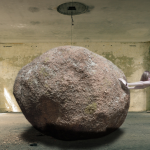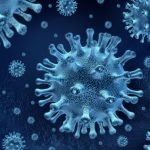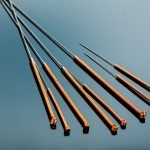A Review of Recent Clinical Trials
Eric Yarnell, ND, RH(AHG)
Pomegranate Marches On
Several impressive but preliminary clinical trials have been published in the past six months on Punica granatum (pomegranate) juice. Of note, the brand used in these studies from POM Wonderful is not the same as all the cheap knock-offs appearing on the shelves. If you want to match the results in this study, stick with the product that was marketed. (Note: The author has no financial connection to this or any other company selling pomegranate.)
The first big news was that 6-8 ounces of pomegranate juice daily significantly reduced serum total PSA levels in 16 of 46 men who had received radiation therapy or had prostatotomies for localized prostate cancer. Fully 83% of men in the trial had longer PSA doubling times, another measure of inhibiting cancer. These preliminary results were considered sufficiently promising to warrant larger trials.
A trial in 60 Brazilian men and women with dental appliances found that rinsing with a tincture of pomegranate fruit was as effective as chlorhexidine for reducing dental plaque. Prior research has suggested a benefit for various pomegranate extracts on periodontal disease.
Policosanol Goes Down in Flames
Numerous double-blind trials conducted in Cuba suggested that policosanol, a wax isolated from sugar cane, was effective for lowering cholesterol levels. All attempts to replicate these trials outside of Cuba have been negative. These trials used the same product tested in Cuba at the same dose.
The unavoidable conclusion appears to be that the Cuban trials were marred by conflict of interest. One company attempting to push a supplement managed to cobble together questionable clinical trial after questionable clinical trial.
Cranberry Safe With Warfarin
In a small trial involving seven patients with atrial fibrillation who were stable on warfarin, 250ml cranberry juice or placebo were added for seven days in a crossover design. There was no change in any clotting parameter studied. Of course, the INR should be monitored regularly in anyone taking warfarin, especially when anything new is added to the treatment regimen, but it appears that Vaccinium macrocarpon (cranberry) at this dose is unlikely to cause problems.
In a similar vein, a trial of 24 healthy people given single doses of warfarin found that single doses of Panax ginseng (Asian ginseng), Ginkgo biloba, Hypericum perforatum (St. John’s wort) and Zingiber officinale (ginger) had no effect on warfarin pharmacokinetics. This doesn’t necessarily mean these herbs might not cause a problem with chronic dosing, especially St. John’s wort.
Raw Garlic for Dyslipidemia
In a small open trial (how could you have a placebo for this?), 30 Pakistani men and women with dyslipidemia consumed 5g raw garlic twice a day. After 42 days, there was significant improvement in all lipid parameters compared to baseline. After 42 days of not eating raw garlic, the benefits faded. Who needs supplements? Let your food be your medicine.
Aralia: Underutilized Immunomodulator
Despite the current ferocious popularity of Rhodiola rosea, other immunomodulating adaptogens are being overlooked. Aralia californica (California spikenard) is one such resource. Though no research has been conducted in humans on this particular species, the Eurasian species A. mandshurica (Asian spikenard) has recently been shown in a small trial (n=30) to be significantly more effective than placebo at reducing body weight, percent body fat and serum triglyceride levels. Perhaps instead of importing exotic herbs from far away we should look to our local exotic herbs first.
 Eric Yarnell, ND, RH(AHG) is a graduate of Bastyr University. He completed a two-year residency with Silena Heron, ND, and served as chair of botanical medicine at SCNM. He is past senior editor of the Journal of Naturopathic Medicine. Dr. Yarnell is a founding member and current president of the Botanical Medicine Academy and author of numerous textbooks and articles, including Naturopathic Urology and Men’s Health, Naturopathic Gastroenterology and Clinical Botanical Medicine. His area of clinical focus is urology and men’s health. He is assistant professor in botanical medicine at Bastyr University.
Eric Yarnell, ND, RH(AHG) is a graduate of Bastyr University. He completed a two-year residency with Silena Heron, ND, and served as chair of botanical medicine at SCNM. He is past senior editor of the Journal of Naturopathic Medicine. Dr. Yarnell is a founding member and current president of the Botanical Medicine Academy and author of numerous textbooks and articles, including Naturopathic Urology and Men’s Health, Naturopathic Gastroenterology and Clinical Botanical Medicine. His area of clinical focus is urology and men’s health. He is assistant professor in botanical medicine at Bastyr University.
References
Pomegranate
Pantuck AJ et al: Phase II study of pomegranate juice for men with rising prostate-specific antigen following surgery or radiation for prostate cancer, Clin Cancer Res 12(13):4018-26, 2006.
Menezes SM et al: Punica granatum (pomegranate) extract is active against dental plaque, J Herb Pharmacother 6(2):79-92, 2006.
Policosanol
Berthold HK et al: Effect of policosanol on lipid levels among patients with hypercholesterolemia or combined hyperlipidemia: a randomized controlled trial, JAMA 295(19):2262-9, 2006.
Dulin MF et al: Policosanol is ineffective in the treatment of hypercholesterolemia: A randomized controlled trial, Am J Clin Nutr 84(6):1543-8, 2006.
Warfarin
Li Z et al: Cranberry does not affect prothrombin time in male subjects on warfarin, J Am Diet Assoc 106(12):2057-61, 2006.
Jiang X et al: Investigation of the effects of herbal medicines on warfarin response in healthy subjects: A population pharmacokinetic-pharmacodynamic modeling approach, J Clin Pharmacol 46(11):1370-8, 2006.
Garlic
Mahmoodi M et al: Study of the effects of raw garlic consumption on the level of lipids and other blood biochemical factors in hyperlipidemic individuals, Pak J Pharm Sci 19(4):295-8, 2006.
Aralia
Abidov MT et al: Effects of Aralia mandshurica and Engelhardtia chrysolepis extracts on some parameters of lipid metabolism in women with nondiabetic obesity, Bull Exp Biol Med 141(3):343-6, 2006.










